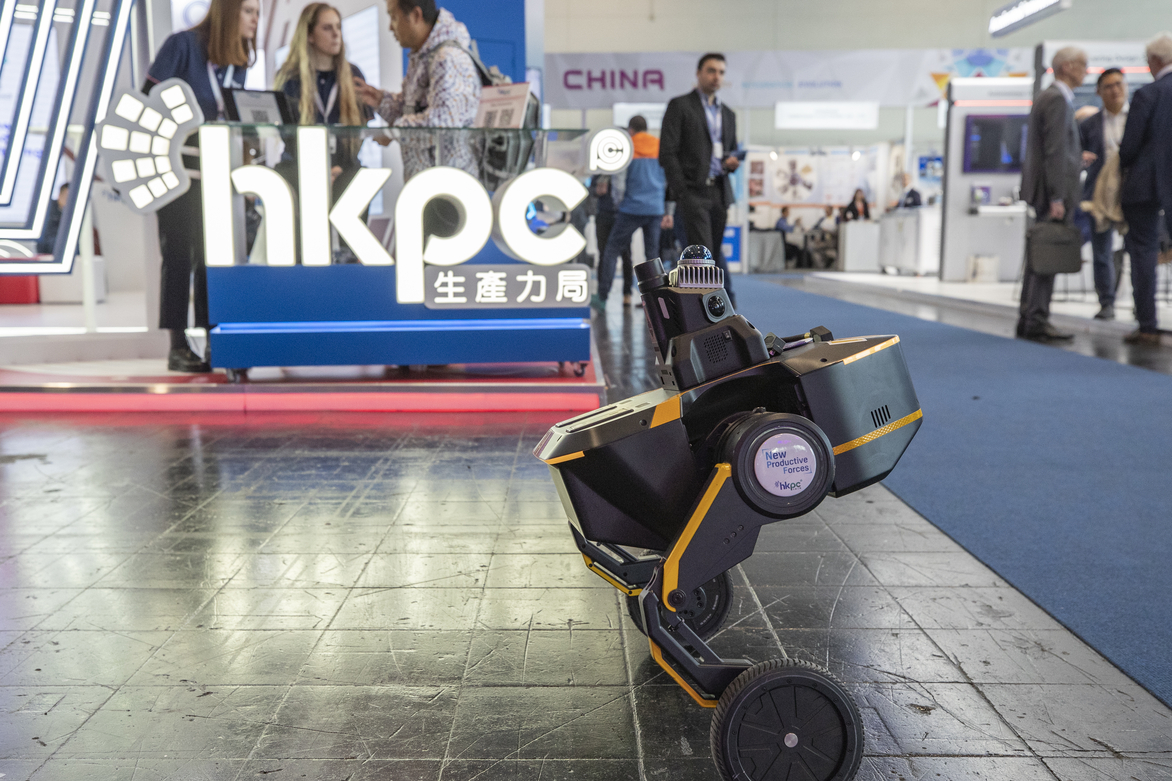Hannover Messe 2025 shows promise of AI's "co-worker" role in future workforce
Xinhua
03 Apr 2025

An exhibitor controls a robot at Hannover Messe 2025 in Hannover, Germany, on March 31, 2025. Hannover Messe 2025, Germany's leading industrial trade fair, opened on Monday with a strong focus on industrial artificial intelligence (AI), highlighting the technology's transformative role in shaping the future of manufacturing. (Xinhua/Zhang Fan)AI agents capable of carrying out the roles of human "co-workers" are gaining attention at this year's trade fair.HANNOVER, Germany, April 2 (Xinhua) -- "Bring me a piece of salted chocolate." When Alexander Zorn gave this order to a computer at the ongoing Hannover Messe 2025, Germany's leading trade fair, an Artificial Intelligence (AI) agent immediately activated a robotic arm to identify and select the correct item. Within around five seconds, the robotic arm handed Zorn the piece of chocolate.Zorn, a data scientist at the Fraunhofer Institute for Intelligent Analysis and Information Systems, told Xinhua that he was demonstrating the "industrial magic" of AI agents. AI agents enable robotic arms to understand human speech and can serve as assistants in industrial production, he explained."The big advantage is that you do not have to code everything on your own. The agent performs the work step by step, coordinating all the necessary actions," he said. "In a traditional setup, you would need coders, programmers, and a specific model for your robot. But with the AI agent, you simply provide it with the instructions, and the agent takes care of all the work."A visitor throws an item through a VR device at Hannover Messe 2025 in Hannover, Germany, on March 31, 2025. Hannover Messe 2025, Germany's leading industrial trade fair, opened on Monday with a strong focus on industrial artificial intelligence (AI), highlighting the technology's transformative role in shaping the future of manufacturing. (Xinhua/Zhang Fan)AI agents capable of carrying out the roles of human "co-workers" are gaining attention at this year's trade fair. Siemens AG President and CEO Roland Busch said at the opening ceremony that Hannover Messe 2025 will show people "how Large Language Models and generative AI will change the industrial world and our energy systems.""Whatever the mix of humans and machines may look like in the future, there is something else we need to do in the meantime in order to change our operating system. We need to learn how to collaborate more in technology-based ecosystems," he said.Digital technologies could also revolutionize the pharmaceutical industry. Axel Lorenz, CEO of process automation at Siemens, told Xinhua that AI agents play a vital role in the company's pharmaceutical production.Lorenz gave the example of Siemens' Industrial Copilot, a generative AI-powered assistant, which can help automation engineers create code more quickly, answer engineering questions, and develop Human-Machine Interface (HMI) visualizations. Also, with the AI-based chatbot Simatic eaSIe, technicians and maintenance personnel can communicate with the system via chat-style conversations or voice interaction. They can also access relevant data from a pharmaceutical plant, which can facilitate maintenance, making it safer and more reliable.This photo taken on March 31, 2025 shows the exhibition booth of "Invest in China" at Hannover Messe 2025 in Hannover, Germany. Held under the theme "energizing a sustainable industry," the five-day event has drawn more than 3,800 exhibitors from around 60 countries and regions. Chinese companies make up a significant portion of participants, with around 1,000 exhibitors, making China the second-largest exhibitor group after host country Germany. (Xinhua/Du Zheyu)Chinese companies also delivered impressive performances at Hannover Messe with Inspur Cloud Information Technology Co., Ltd. showcasing its Hairuo agent."The key concern for customers is solving real-world challenges in specific scenarios, to ensure that intelligent solutions can be effectively applied in practice," Zhou You, head of the Hairuo solution at Inspur Cloud, told Xinhua. "With the Hairuo agent, we have integrated various technology modules to provide our customers with a comprehensive solution."Despite its emerging impact, AI agents still face challenges in practical application. Christian Buckner, senior vice president of Altair Engineering Inc., said in his keynote speech during the event that when deploying AI agents in industrial production, issues such as data silos and data complexity need to be overcome."The first thing you need to do is to get the data harmonized," he explained. "In particular, for generative AI, effective agents must have the appropriate context."This photo taken on April 1, 2025 shows a robot at the exhibition booth of Hkpc at Hannover Messe 2025 in Hannover, Germany. (Xinhua/Zhang Fan)Elements like a knowledge graph are needed to support the contextual model of the semantic framework, he added. Agents require episodic memory to track past interactions and must be able to learn over time, as humans do, he explained."When you have an AI agent that's backed by a knowledge graph, that means you hire, quote, and unquote agents that have experience," he said. "That means those agents will be much more effective. They can take on much larger roles in organizations, not just the simplified task," he added.
